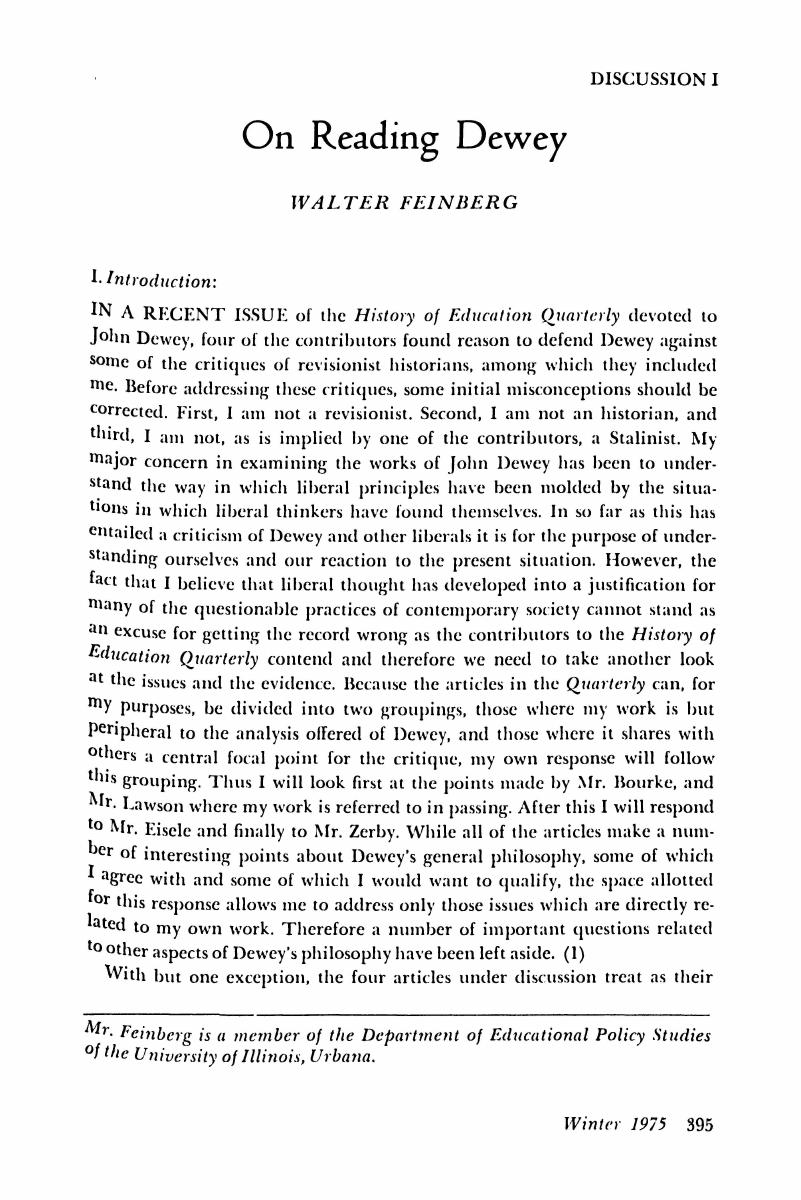No CrossRef data available.
Published online by Cambridge University Press: 02 June 2017

1. Some of these issues I have dealt with in a recent work, see Reason and Rhetoric: The Intellectual Foundations of Twentieth Century Liberal Educational Policy (New York, 1975).Google Scholar
2. See Feinberg, Walter, “Progressive Education and Social Planning,” Teacher's College Record, 73 (May 1972): 486–505.∗ CrossRefGoogle Scholar
3. See Yezierska, Anzia, All I Could Never Be (New York 1932), pp. 82–83.Google Scholar
4. Ibid., p. 39.Google Scholar
5. Ibid., pp. 70–71.Google Scholar
6. I am indebted to my colleague Joe Burnett for the information on Davidson.Google Scholar
7. Lawson, Alan, “John Dewey and the Hope for Reform,” History of Education Quarterly, 15 (Spring 1975): 61.CrossRefGoogle Scholar
8. Christopher Eisele, J., “John Dewey and the Immigrants”: in ibid.: 68.Google Scholar
9. Ibid., p. 77.Google Scholar
10. Ibid., p. 78.Google Scholar
11. Ibid., p. 78.Google Scholar
12. Feinberg, , “Progressive Education”: 495, parenthesis added here.Google Scholar
13. Ibid.: 486.Google Scholar
14. Ibid., p. 496.Google Scholar
15. Eisele quoting Dewey, p. 74, at the risk of encouraging Eisele's scorn, I have left out part of the quotation.Google Scholar
16. Ibid., p. 79.Google Scholar
17. Dewey, John, Confidential Report: Conditions Among the Poles,” (Washington, D.C., 1918), p. 4.Google Scholar
18. Ibid., p. 53.Google Scholar
19. Bourke, Paul F., “Philosophy and Social Criticism: John Dewey, 1910–1920,” History of Education Quarterly, 15 (Spring, 1975): 12.CrossRefGoogle Scholar
20. Zerby, Charles J., “John Dewey and the Polish Question: A Response to the Revisionist Historians,” History of Education Quarterly, 15 (Spring, 1975): 17.CrossRefGoogle Scholar
21. Ibid., p. 22.Google Scholar
22. Ibid., p. 23.Google Scholar
23. Ibid., p. 23.Google Scholar
24. Ibid., p. 21.Google Scholar
25. Dewey, , Polish Study, p. 39.Google Scholar
26. Dewey, John, “Conscription of Thought,” The New Republic (Sept. 1, 1917): 129.Google Scholar
27. Dewey, , Polish Study, p. 1.Google Scholar
28. Ibid., p. 53.Google Scholar
29. Dewey, , The Polish Report, p. 56.Google Scholar
30. See Hudy, , Mary Claudianne, Sister, “The Political Activities of Ignace Jan Paderewski in the United States, 1915–1918,” (Unpublished master's thesis, Medaille College, 1968). I am indebted to a paper by William E. Mayer, Jr. of the State University of New York at Buffalo for bringing this source to my attention.Google Scholar
31. As quoted in Wytrwal, Joseph A., Poles in American History and Tradition (Detroit, 1969) p. 328.Google Scholar
32. Ibid, p. 322.Google Scholar
33. See “Progressive Education,” etc.: 502–504.Google Scholar
34. Dewey, , Polish Report, p.2.Google Scholar
35. Ibid., p. 4.Google Scholar
36. Wilson, Woodrow, History of the American People, Vol. 5 (New York, 1902). p. 212. I am indebted to Mayer's paper for bringing this quotation to my attention.Google Scholar
37. Zerby, , “John Dewey and the Polish Question,” p. 25.Google Scholar
38. Dewey, as quoted by Feinberg, as quoted by Zerby, , “John Dewey and the Polish Question,” p. 25, emphasis added here.Google Scholar
39. Ibid., p. 26.Google Scholar
40. Feinberg, , “Progressive Education,” etc.: 493.Google Scholar
41. See Zerby, , “John Dewey and the Polish Question,” p. 19.Google Scholar
42. Ibid., p. 22. Zerby is quoting Dewey.Google Scholar
43. See Polish Report, p. 30.Google Scholar
44. Ibid., pp. 30–31.Google Scholar
45. See Rev. Swastek, Joseph, The Polish American Story (Buffalo, n.d.), p. 11, as reported in Mayer.Google Scholar
46. See Greene Balch, Eily, Our Slavic Fellow Citizens (New York, 1910), p. 378.Google Scholar
47. See Wytrwal, , pp. 194–197.Google Scholar
48. Ibid., p. 158.Google Scholar
49. Ibid., p. 26. Zerby quoting Feinberg.Google Scholar
50. This is the argument that I essentially try to make in Reason and Rhetoric and then further elaborate in a more general way in an article entitled “Educational Development Under Two Conflicting Models of Equality,” Theory and Society (Amsterdam, 1975), vol. 2, pp. 183–210.CrossRefGoogle Scholar
51. Feinberg, , “Progressive Education,” etc.: 493–484.Google Scholar
52. See Feinberg, , quoting Wirth, “Progressive Education,”: 487.Google Scholar
53. Zerby, , “John Dewey and the Polish Question,” p. 27.Google Scholar
54. Feinberg, , “Progressive Education,”: 488.Google Scholar